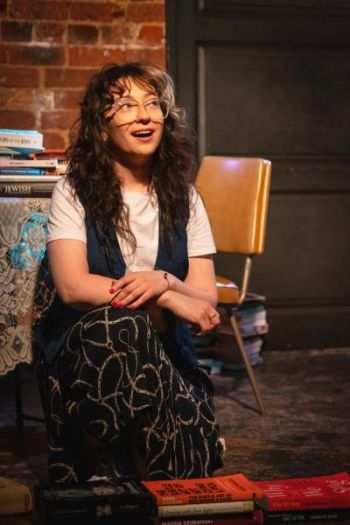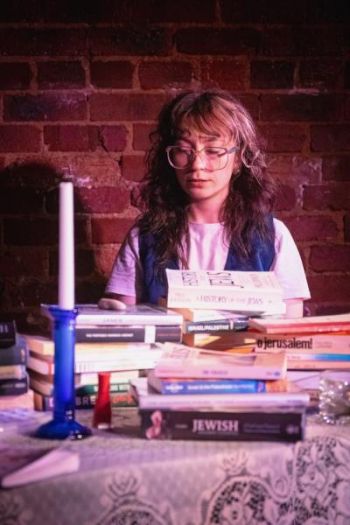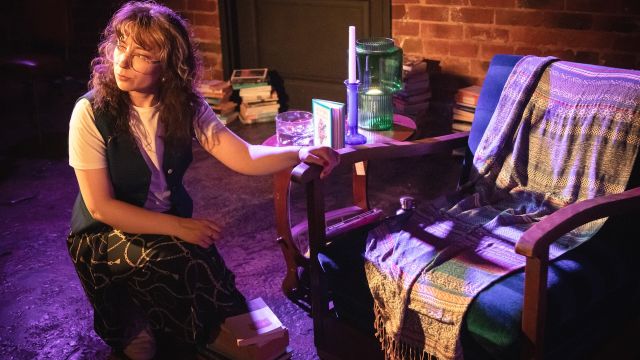NIUSIA
Beth Paterson opens the show, sitting at a table, surrounded by archive boxes. There are dozens of books piled up on and around the table – the spines suggest history, culture, philosophy – and Barry Humphries.
Paterson tells us of her Saturday morning visits to see her Nana, bribed with a hot chocolate, and aged 14, watching the clock so she’d know when it was time to leave. She didn’t want to be there – her Nana, Niusia, might have been a holocaust survivor, a concentration camp hero, but to teenager Beth, she was a bitch.
 Paterson’s childhood memories are elevated by recordings of her mum, Suzie, who tells her own stories of her mother: of parties with Olympians, an embarrassed customer of Niusia’s ‘Foot-is-cray’/Footscray dress shop (not Barry Humphries, but he’s connected), and her forthright negotiations with the landlord. Niusia was born in Poland in the 1920s, coming to Australia with her daughters after surviving the war, and almost always changing the subject whenever anyone asked her about it.
Paterson’s childhood memories are elevated by recordings of her mum, Suzie, who tells her own stories of her mother: of parties with Olympians, an embarrassed customer of Niusia’s ‘Foot-is-cray’/Footscray dress shop (not Barry Humphries, but he’s connected), and her forthright negotiations with the landlord. Niusia was born in Poland in the 1920s, coming to Australia with her daughters after surviving the war, and almost always changing the subject whenever anyone asked her about it.
But that isn’t Paterson’s style, nor is it her mum’s – so with clever conversations between stage Beth, recorded Suzie, and Paterson’s switch to Niusia, we get to experience three generations of women living, working and influencing in suburban Victoria. And we get to know some of the stories from before her Nana came here.
Paterson also steps out of the diegesis of stage Beth and into performer Beth, offering us context, details on discussions with her co-creator and director Kat Yates, and asides from the stories. Paterson does this seamlessly, engaging the audience with ease, reassuring us it’s okay to feel and express emotions that might seem out of place.
For when the stories of Niusia’s time in the concentration camps are told, there are moments of humour. One particularly outrageous German pun is met with out-loud laughing from the audience, and Paterson is quick to tell us that reaction is okay.
 Director Yates expertly guides Paterson around the stage, violently emptying boxes of yet more books, then with immense tenderness as she scans the titles, or as she kneels at Nana’s now-empty chair. Paterson is brilliant: she is open, honest, funny, utterly engaging in all the good and bad stories, and disarmingly emotional as her importance of family grows with each reveal. And she sings beautifully too.
Director Yates expertly guides Paterson around the stage, violently emptying boxes of yet more books, then with immense tenderness as she scans the titles, or as she kneels at Nana’s now-empty chair. Paterson is brilliant: she is open, honest, funny, utterly engaging in all the good and bad stories, and disarmingly emotional as her importance of family grows with each reveal. And she sings beautifully too.
Through discovering the family history, Beth recovers the love that her Nana had for her own daughters, and for everyone around her, beyond the trauma and its resulting bitterness that the teenage-Paterson experienced. And in sharing that with the Goodwood audience, it’s a touching reminder of the importance of our own family connections, however difficult they might be.
The first few performances of this show are in the Main Theatre at Goodwood, which is a traditional theatre, with a raised stage and raked rows of seats. Later in the season, it moves to the Studio at the same Goodwood venue, a smaller black box space, and one which affords more intimacy in storytelling – if it feels this close and personal in the theatre, it should be an extraordinary experience in the Studio.
This is Beth’s story, but more than that, it’s her mum’s story, her Nana’s story - this is a vital story for all of us. Quoting a lesson from the Talmud, she tells us to ‘turn it again, for everything is in it’.
Review by Mark Wickett
Subscribe to our E-Newsletter, buy our latest print edition or find a Performing Arts book at Book Nook.

